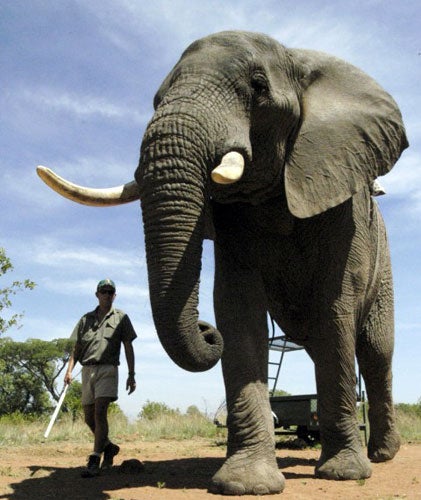Slaughter of the elephants
Legal ivory sale linked to poaching surge across Kenya's huge Tsavo National Park

There has been an "unprecedented" surge in elephant poaching in one of Kenya's principal national parks since a large-scale ivory sale late last year, which gave a renewed boost to the international ivory market.
The sale was of more than 100 tonnes of legal ivory from four southern African countries whose elephant populations are not threatened, Botswana, Namibia, South Africa, and Zimbabwe. It was permitted by the UN's Convention on International Trade in Endangered Species (Cites) in the teeth of fierce opposition from many observers, from environmentalists to politicians, who warned it was bound to stimulate the illegal ivory trade across Africa, and increase the killing of elephants in other countries further north where elephants are much more at risk.
The Labour MP Alan Simpson said at the time: "This is obscene. This isn't a licence to trade. It's a licence to kill, and Britain should not be party to it."
Now five elephants have been killed illegally in the past six weeks in Kenya's Tsavo National Park, home to Kenya's largest single elephant population of about 11,700. Kenyan wildlife officials and conservationists are making a direct link between the recent ivory auctions and the deaths.
"We have noted an unprecedented rise of elephant poaching incidents in Tsavo," said Jonathan Kirui, Tsavo's Assistant Director. "Our security team is on full alert, and is going full force to ensure the poachers are deterred."
James Isiche, the director of the East African regional office of the International Fund for Animal Welfare (IFAW), is concerned that the incident could portend a return to the mass-poaching era of 1970s and 1980s, when African elephant numbers fell from 1.3 million to 625,000 in a decade; the international ivory trade was banned in 1989.
"We believe that there is a strong correlation between this upsurge and the ivory stockpiles sales allowed by Cites that were completed in late 2008," Mr Isiche said. "Our concern is that the situation may be even worse in other elephant range states which face more serious law enforcement capacity challenges, as compared to Kenya or some of the southern Africa countries. The situation is dire, and needs to be stopped before it escalates further."
Only last week, a leading elephant researcher, Dr Cynthia Moss, released a report indicating that an elaborate poaching syndicate had led to a surge in elephant killings in another Kenyan National Park, Amboseli. Sources in the Kenyan Wildlife Service say elephant poaching in Kenya rose by more than 60 per cent in 2008 compared to 2007.
The bodies of the five elephants recently killed in Tsavo were found, with their tusks hacked off, in three different parts of the park. Kenya Wildlife Service rangers have arrested two suspected poachers and one middleman, and recovered two AK-47 rifles and 38 rounds of ammunition.
IFAW sources say the middleman had already sold the tusks to other dealers in the illegal ivory trade network. An elephant carcass was found close by. The other elephants are suspected to have succumbed to poisoned arrow wounds.
Many people warned that such killings would increase when news of the proposed four-nation ivory auction emerged last July. It was the second time since the 1989 ivory trade ban that a sale of legal ivory (from elephants that died from natural causes) was being permitted; the first, from the same four southern African countries, of 50 tonnes of ivory, was in 1997, pushed forward by Zimbabwe's Robert Mugabe, in the face of many protests.
The second sale raised even more concerns, not least because, for the first time, China was being allowed to bid as a legal ivory buyer, alongside Japan. China not only has a potentially gigantic demand for ivory, but is already the home of a flourishing underground market.
Conservationists feared that the unleashing of a massive Chinese demand for traditional and popular objects such as trinkets, name seals, expensive carvings and polished ivory tusks would itself give an enormous boost to the illegal trade, which is entirely poaching-based.
Join our commenting forum
Join thought-provoking conversations, follow other Independent readers and see their replies
Comments
Bookmark popover
Removed from bookmarks